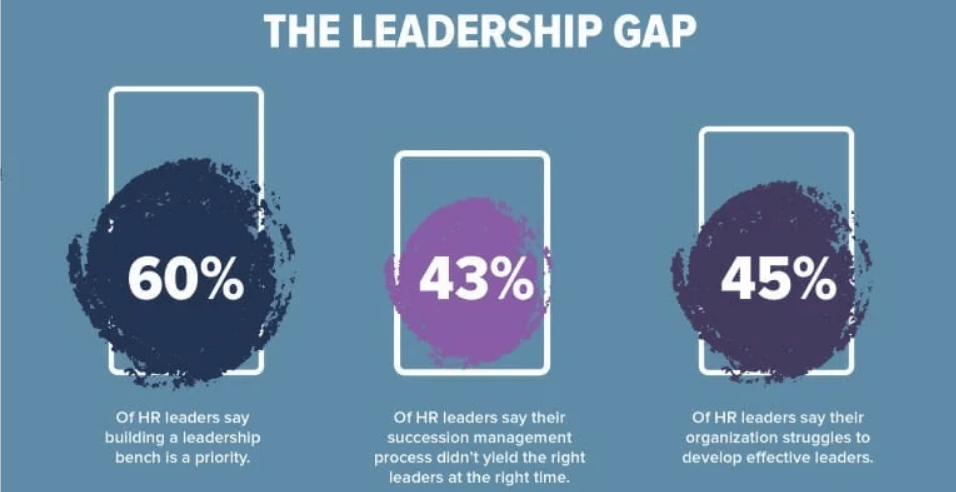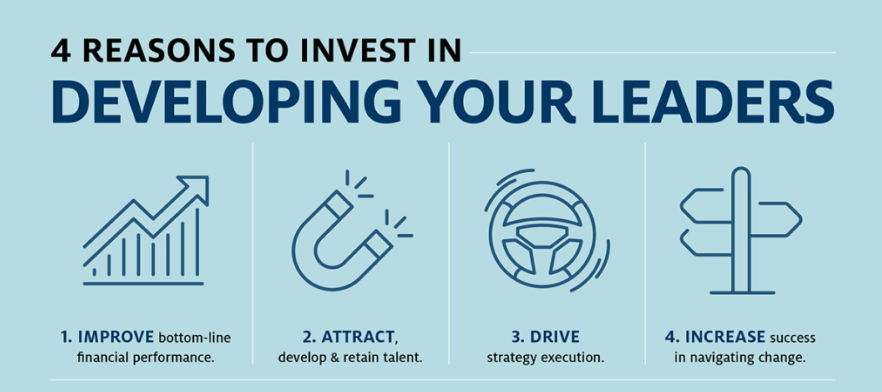Dive into the art of cultivating early career leadership with insights on how to nurture future leaders, ensuring organizational growth. Find out what are the most effective ways to grow leadership within your organization.
The consistent technological shifts and global talent crises call for ethical decisions and positive change. Research shows that an effective leader is a catalyst for that change.
However, there’s a need to cultivate the potential wherever it’s found to uncover the leaders of tomorrow.
Think of it as sculpting – identifying raw material, shaping it through the right training and mentorship, and refining it into something remarkable.
Developing leaders will ensure the continuity of innovation and the legacy of progress.
This guide digs into the importance of leadership and the steps you can take to nurture future leaders.

How to Nurture Future Leaders
Future leaders development within your organization requires a multifaceted approach combining character building, mentorship, and skill enhancement.
Here’s a quick breakdown of the process.
- Identifying potential
A few leaders are born, while others develop their skills through experience and learning. This implies while qualities like adaptability, critical thinking, and empathy make one a leader, those who are willing to take the initiative also possess the tendency to become an effective leader. Once you identify someone’s potential, they can be trained to become leaders.
- Tailored mentorship
Mentorship isn’t a one-size-fits-all. Since each individual has unique strengths and aspirations, it is crucial to offer personalized mentorship. Experienced mentors can share valuable insights, provide guidance, and offer feedback to shape someone’s leadership journey.
- Skill development
A leader is required to hone various skills, including decision-making, problem-solving, conflict resolution, and, above all, emotional intelligence. This means they must be exposed to different challenging situations that help them build a versatile skill set.
- Promote self-awareness
Leaders must know about their strengths, weaknesses, and areas of improvement. Reflection and introspection help them work on their shortcomings.
- Empower decision-making
Leaders are excellent decision makers, says research. Therefore, organizations must provide opportunities for future leaders to make decisions and take ownership of projects. Fostering accountability will boost their confidence and improve their decision-making skills.
- Challenge comfort zone
Growth requires one to step out of their comfort zone. To develop future leaders, you must present them with challenges that require innovative problem-solving and creative thinking.
Training and Coaching of Future Leaders
Studies show that learning leadership can help sharpen communication skills and emotional intelligence.
Training plays an integral role in shaping a leader for a brighter future. This may involve structured learning, imparting specific skills and knowledge required for leadership roles.
Future leaders training teaches essential concepts like communication, project management, and strategic thinking. This equips them with practical tools to tackle challenges effectively.
Contrarily, coaching future leaders is about providing personalized guidance and helping them identify their strengths and shortcomings.
Introspective conversations and constructive feedback allow them to polish their decision-making abilities, emotional intelligence, and self-awareness.
Combining structured training with personalized coaching is crucial to building robust leaders who excel in diverse leadership scenarios.
Why investing in Future Leaders?
Future leaders hold immense importance because they shape the trajectory of societies, communities, and organizations.
Investing in programs like leadership development and management trainee programs can become fruitful for your organization in long term. Here are a few of the reasons why you should invest to nurture future leaders:

1- Your Employees Feel Motivated
Every employee expects future opportunities in his or her organization. When you make them feel that you are giving them growth chances then their productivity and engagement increases. This enhances your bottom-line results too.
2- Reduced Turnover
Growth opportunity makes the employees feel valued and they plan to stick around longer when they feel that you are offering them the opportunity to lead and grow.
3- Profitable Decision-Making
The organized training make your future leaders take wise decisions through acquired leadership skills and knowledge. It will help the organization to achieve goals and make profit.
4- Enhanced Innovation
A leader has a capability to think creatively and when you offer a growth atmosphere then your leaders will be able to bring in innovative ideas giving you a competitive edge in the market.
5- Overall Morale Boosted
Overall mood at the workplace is crucial for the growth of the company. The leader development makes everyone feel valued which boosts the morale of everyone.
Investing in their development means fostering a pipeline of capable individuals who can lead a workforce with integrity.
They inspire and guide others to be their best version and contribute to sustainable growth.
Uncovering Future Leaders
Uncovering future leaders requires a strategic and deliberate approach. Here are a few tips that might help.
- Spot the individuals who consistently excel in various scenarios. Take the initiative and display their natural leadership qualities in different situations.
- Use performance reviews, assessments, and feedback from peers to identify the potential of future leaders. Gamified assessments can help you achieve that by assessing their skills through interactive games.
- Look for people who, besides performing well in their existing roles, demonstrate a willingness to learn and a hunger for growth. These individuals are more likely to accept and perform well when given additional responsibilities.
- Individuals who focus on long-term goals and sustainable solutions also possess leadership potential.
- Those who exhibit self-awareness, empathy, and the ability to manage relationships effectively also have the tendency to become great leaders.
Final Word
It’s definitely not an easy task to nurture future leaders— it’s a commitment to foster a tradition of positive impact.
You can transform any individual into a leader through the right blend of training, coaching, and opportunities.
By cultivating ethical values and developing essential skills, you contribute to a brighter future. This investment is the advancement of organizations and society, ensuring we have capable hands to steer us through the challenges that lie ahead.
